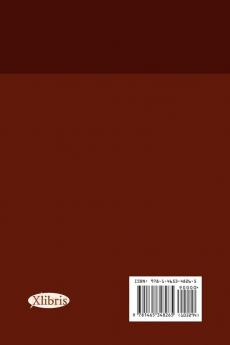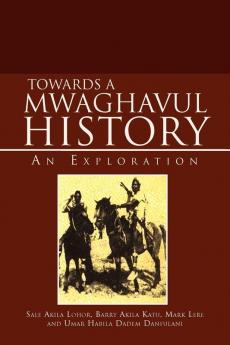English
Paperback
₹1580
₹1672
5.5% OFF
(All inclusive*)
Delivery Options
Please enter pincode to check delivery time.
*COD & Shipping Charges may apply on certain items.
Review final details at checkout.
Looking to place a bulk order? SUBMIT DETAILS
About The Book
Description
Author
The History Of The Mwaghavul Is A Long One Documented In Various Forms Ranging From Records Of Administration By The Colonialist To The Documentation Of Archaeological Discoveries By White Explorers And Administrators Documentation And Analysis Of Languages Oral Lore And Culture By Linguists And The Latest Series Of Narration And Documentation Of Various Aspects Of The Mwaghavul People By Students And Individuals. These Have Not Been Collated Into A Single Source Of Information About The Mwaghavul.Information On The History Of The Mwaghavul Are Mostly Found In Students Thesis Dissertations And Long Essays On Mwaghavul Origin The Jos Museum National Archives Kaduna (Nak) The Jos Province (Jos. Prof) Archival Materials And The History Department Of The University Of Jos And Other Nigerian Universities.Providing A Comprehensive History Of The Mwaghavul For Its Future Generations Is The Aim Of This Book. This Is In View Of The Fact That Most Of The Older Publications And Documented Information On The Mwaghavul Are Out Of Print. In Addition The Transmission Of History From The Elderly To The Younger Generation Is Dying Out As The Gap Between These Two Is Ever Widening Because Of The Rural-Urban Drift In The Country And The International Migration Of The Mwaghavul People.Primary Source Of Information Was Obtained From Oral Traditions Of The Mwaghavul People With Focus Group Discussions Conducted With Elderly Mwaghavul People And Opinion Leaders Including Visits And Interviews Of Individuals During Key Mwaghavul Festivities Such As Ryem-Pushit Titdiu-Kombun Kopshu-Mpang West Bwanzuhum-Kerang And Wus-Panyam. Secondary Data Were Sourced From Written Documents And Records Of Colonial Administration Explorers And Early Missionaries. Other Sources Of Secondary Data Were Academic Write-Ups On Mwaghavul Students Thesis In Nigerian Tertiary Institutions And Write-Ups On Mwaghavul By Individuals In The Society. The Use Of Both Indigenous And Corrupted (By English Or Hausa) Names For Mwaghavul Polity And Places Are Generally Adapted In This Work.The Mwaghavul Language Is Among The Afro-Asiatic Languages Spoken On The Jos Plateau And It Belongs To The Chadic Sub-Family As Indicated By Isichei (1982 P. 7) And Meek (1971). Although Meek Places It Under The Hamitic Group Ames (1983) Isichei (1982) And Danfulani (1995A 2003) Place It Under The Nilo-Saharan Or Afro-Asiatic Under The Chadic Sub Unit. Professional Linguists Among Them Crozier & Blench (1992) Zygmunt Frajzyngier (1991 1993) Paul Newman (1990) Carl Hoffman (1976) Joseph Greenberg (1966) Hermann Jungraithmayr (1963/64 1970) And Hermann Jungraithmayr And D. Ibriszimov (1994) All Agree With The Opinion Given Above When They Unanimously Assert That Mwaghavul As A Language Belongs To The Chadic Branch Of The Afro-Asiatic Which Is Elsewhere Referred To Such In The Works Of Richard Morr (1968) And Daniel N. Wambutda (1991) As Nilo Saharan. This Makes The Mwaghavul And Their Other Chadic-Speaking Neighbours Of The Jos Plateau And Other Groups Scattered Between The Chad-Borno Basin And The Jos Plateau Hills The Kinsmen Of The Maguzawa Or The Hausa Which Constitute The Single Largest Chadic-Speaking Group In The Whole World.Isichei (1982 1983) Further Notes That Mwaghavul Is Closely Related With And Is Mutually Intelligible To Goemai Ngas Montol Mupun Mship Chakfem Yuom Mushere Kulere Jipal Njak And Other Chadic Languages Spoken On The Eastern Part Of The Jos Plateau Especially In Bokkos Pankshin Kanke Mikang Tal And Shendam Local Government Areas Of Plateau State.According To Proponents Of The Migrant View The Chadic Speakers Presently Found On The Jos Plateau Left Borno Between 1100 A.D. And 1350 A.D. They Were Among The Pre-Kanuri Inhabitants Possibly Associated With The So Who Had Occupied The Plains Of The Chad Basin. In Mwaghavul So Or Sokho Means Horse Racing. The Mwaghavul Are Noted As Horse Riders And War
Delivery Options
Please enter pincode to check delivery time.
*COD & Shipping Charges may apply on certain items.
Review final details at checkout.
Details
ISBN 13
9781465348265
Publication Date
-22-08-2011
Pages
-298
Weight
-407 grams
Dimensions
-152x229x17.01 mm











